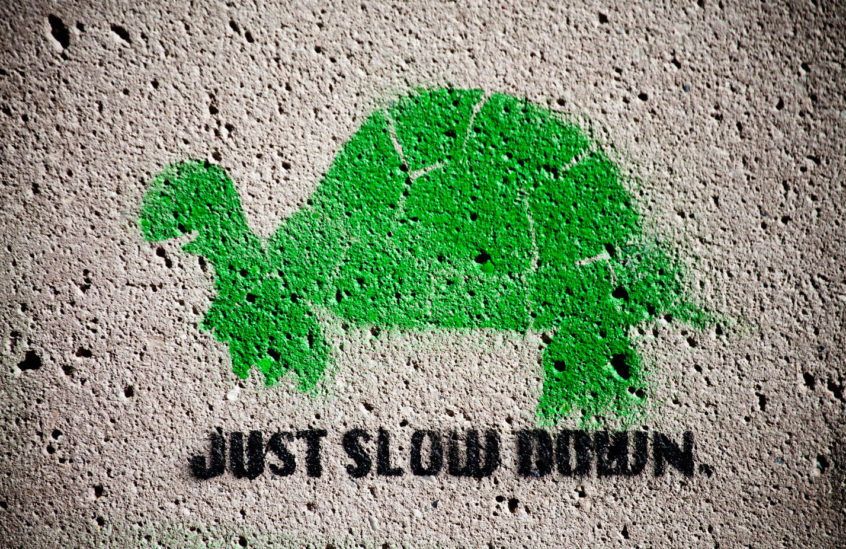In our fast paced world, we want everything to move at lightning speed. We want a quick coffee, a fast lane free of traffic, a front row parking spot, high-speed internet, instant messages, efficient phone calls, fast food, and rapid transit. We want to order everything online: music, gifts, movies, books, groceries, and even people. Online dating has become the norm as people want to quicken everything in our fast paced world, including relationships. In this post I will review Carl Honore’s book In Praise of Slow and discuss The Slow Movement.
In Praise of Slow
One question I absolutely want you to ask yourself is this:
Is Faster Better?
Carl Honore, author of the international bestseller In Praise of SLOW; How a Worldwide movement is Challenging the Cult of Speed ascertains,
“If we are ever going to slow down, we must understand why we accelerated in the first place.”
Historically speaking, each new wave revolution of technology has come with one promise: this will make your work faster, so you can have more time off. From past presidents to TV commercials, speed offers the payoff of more pleasure and increased leisure time. But, for most of us, the addiction to speed has not paid off. Instead of achieving more pleasure, we are simply feeling more pressure. We feel pressure to produce, to keep up, to achieve at a super-human rate, and regardless of the latest trends in technology, we are not seeing the payoff.
Life In The Fast Lane
In fact, Americans are working harder than ever. In recent surveys, the average Western Worker has dramatically increased their hours over the last thirty years.
The double edged sword of technology is this: while new technology is becoming faster and more affordable, we are becoming more accessible, and the ability to work all hours of the day is increasingly easier. Where most folks used to go and clock in and out of the office, now we are carrying the office around with us in our PDA’s and laptops. Scarily, the line between work time and play time is fading fast.
Fast as a Lifestyle Choice
When we move at record breaking speeds, someone else is always in our way. People become an irritating nuisance and are simply just slowing us down. Busy people are always preoccupied with “What’s Next” and rarely have time to sit and focus, or have a relaxed conversation. They might be there in person, but they are forever checking off their mental To Do list in their head and fidgeting with their PDA or cell phone. As I was reading Honore’s book on becoming slow, two profound phrases popped into my head:
- Fast people aren’t happy.
- Busy people are tired.
With priding ourselves on getting everything done at warp speed, and busying ourselves from a.m. to p.m., we have become a society of unhappy and tired people. Oh. My. God. This brings me back to Honore’s original question…
Why the accelerated pace, in the first place?
Quality of Life
The original idea, in and of itself, makes sense. If we speed up processes (products, goods, technology, convenience items), we will have more time to ultimately improve our quality of life and have more time to enjoy them. But here’s where we went Horribly Wrong: We didn’t just speed up the processes, we sped up our WHOLE LIVES. And, with anything, when a process is accelerated, the quality drops. Not convinced? Here are some examples to get your thinker thinking:
Food: processed food might be fast, but it is pumped full of salt, fat, and sugar to give it any flavor at all. In essence, the sacrifice is less nutrition, and more calories, which lead to health issues and an early grave.
Sleep: Nowadays, people are getting less sleep. With continued stress to perform more, and increased anxiety about work and deadlines, many people actually Cannot Sleep. Insomnia issues are clearly related to stress, and the less we get, the more burnt out we will actually become.
Sex: Sorry folks, but if any of us are being realistic, a quickie doesn’t cut it. Many relationships are failing simply because there is not enough time or energy left in the day to be intimate, or get it on. Viagra? Need I say more?
Safety: Yes, everything is moving faster, with that, more fatalities are happening. When we don’t pay attention to what we are doing, we have accidents.
Vacations: If people are even taking them (most aren’t) it is the “let’s cram everything we can see in one or two weeks overseas”. This leads to what I would like to call Museum-ittus. You become a walking tour zombie, haunted by images of paintings in the night, and loathing the next ticket line or form of public transport. Don’t even get me started on cobblestone and strollers.
Relationships: A fast and furious rush through the milestones of life isn’t what I call romantic. And navigating through stranger’s photos or getting “Hello Sexy” IM’s on facebook is creepy. What ever happened to good old fashioned romance?
Personal Development: We want overnight enlightenment, and will pay buckets to get it. The bestselling books aren’t the ones that walk us through slowly, they are the “Tell me how to do everything quickly NNNNNNNOOOOOOOOOOOOWWWWWWWWWWW!” And, yes, they sell–but, no, they don’t work; because change is a slow and deliberate process.
The Slow Movement
We are not stupid. We are starting to realize that this way of life isn’t cutting it. This Mayhem Madness is not the Path to Enlightenment, and surely isn’t making us happy at the end of the day. For this reason, many people are simply opting out. They are not putting on tie-dyed shirts and starting communes, and they are not sluggishly lying about in a fantasy world; they are simply redefining what is important to them, taking the time to slow down, and doing more of it. My philosophy, exactly.
This book was a real eye-opener for me. Not just finding out that people are sick of the game, but realizing that there is an Actual Movement of people that have sprung up all over the world that are collectively making a difference in their area of choice. I’ll be sharing some of those links below for you to check out, but my main takeaway from the book is this:
The idea of Time Management is not to go faster so you can cram more stuff in your day. It is to be smart about your processes so you can increase the time you spend in meaningful activities, thereby improving the overall quality of your life.
Want to Learn More about Improving Your Life With Time Management? Click here to see my course.
Slow Resources:
More info on Slow: The Slow Movement wiki-style
I loved this one, “The International Institute of Not Doing Much“
A gizillion Slow Resource Links from SlowPlanet.com:
http://www.slowplanet.com/blog/slow-links/
and, click here to buy In Praise of Slow. It’s about $1.50 for a used copy and WELL worth your while.
Questions?? Comments?? What could you do more slowly?


